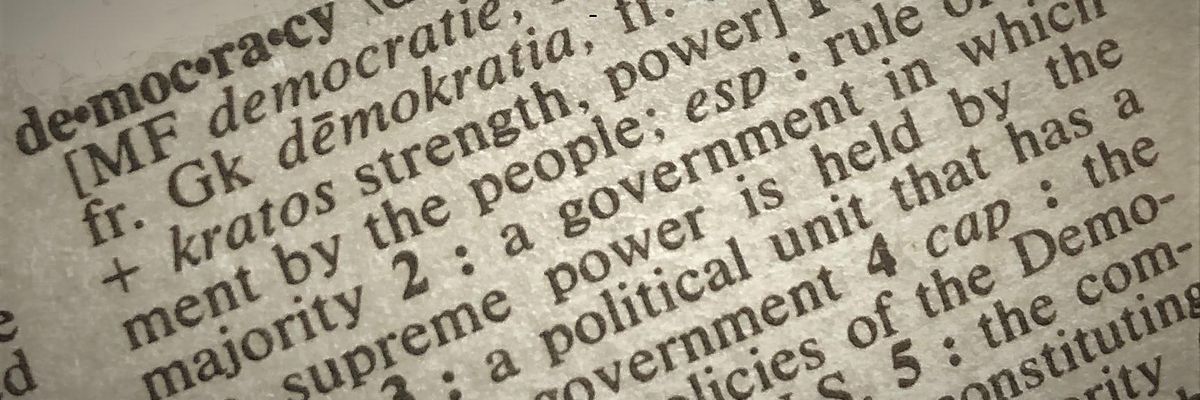Celebrating the inauguration of a new president and an end to years of attacks on democracy is a perfect moment to probe together: What do we mean by democracy in the first place?
Here's where I start.
Beyond our physical essentials, to thrive every human needs to experience three states of being:
First, we need to feel personal agency--to know that our voices count. Philosopher Eric Fromm labeled it as our simple need to "make a dent." Yes, we like to make things happen!
Second, we need meaning--a sense of purpose beyond our own survival.
And third, people need connection. So, we do best when we experience our power and meaning in communities of common purpose.
For me, these three--a sense of personal power, meaning, and connection--enable us to experience dignity. Dignatus is the Latin root of this beautiful concept, connoting a sense of worthiness.
And what does dignity have to do with democracy?
Everything. I believe that the premise of dignity is what our nation's deeply flawed--yet insightful--rebel founders were getting at when they asserted it to be "self-evident, that all men are created equal."
All-important then is the necessity to foster the three conditions--dispersions of power, transparency, and mutual accountability--that, for me, define democracy and have proven to keep the worst within us in check while bringing forth the best.
And democracy is humanity's only vision of governance--i.e., a way of living with each other and the Earth--holding the potential to enable positive dignity. I say "positive" because I am also painfully aware that our species needs these essentials so profoundly that if we cannot meet them in a constructive way, we turn to destructive strategies. Terrorism, we know, can fulfill these same needs.
So, my case for democracy is based on a triad defining its foundations. First, inclusive, distributed power. Second, transparency to keep power accountable to the "general welfare," as our own constitution's preamble prescribes as central to our nation's purpose. Third, democracy requires, and nourishes, a culture of mutual accountability. "Some are guilty, but we're all responsible," as Rabbi Abraham Joshua Heschel reminds us.
Thus, for me, it is no surprise that it is in the times when we've enabled the opposite of these three positive conditions to arise that humanity has experienced its darkest hours. And, in this moment, if we are honest with ourselves, we can see their manifestations--in increasingly concentrated power, secrecy in public affairs, and a shaming-and-blaming culture.
Today, when the climate emergency is putting life itself at risk--we have a great gift: clarity.
Along with proof of our species' outsized, long-evolved capacities for empathy, cooperation, and fairness, we also have inescapable evidence of their opposing tendencies: that most of us--not just a few psychopaths--are capable of callousness and even unspeakable brutality. All-important then is the necessity to foster the three conditions--dispersions of power, transparency, and mutual accountability--that, for me, define democracy and have proven to keep the worst within us in check while bringing forth the best.
From this framing of humanity's challenge, it becomes clear that the greatest, most immediate obstacle we face is our failure to grasp this truth--to cling instead to the premise that "those bad people" are what's doing us in.
With clarity, however, that virtually all are capable of evil and thus all are responsible for creating the conditions that restrain us, must come courage--courage to get busy creating these conditions, i.e. democracy. Democracy is of course not a fixed structure we inherit. Its essence is "eternal struggle" that's "easily lost and never fully won," said our first Black appellate judge, William Hastie.
In other words, to save the democracy we thought we had we must take democracy to where it's never been.
And the stirring news, perhaps for the first time, is that Americans are getting it: that no matter what rips most at our hearts, be it the climate crisis, the evil of endemic racism, or the extreme suffering of needless poverty exposed by COVID-19, none--we know--can be met without democracy. We are joining in new alliances with dignity as our lodestar and John Lewis as our patron saint. At least he is mine. Framed by John Lewis as "good trouble," together we may discover we can do what we before thought to be impossible. To spread this good news, my Small Planet Institute has co-created with the Democracy Initiative a new online portal--www.DemcracyMovement.US--to this positive uprising. Here we can learn, connect, and act for democracy wherever we are.
So, let us ever more consciously cultivate the power, meaning, and connection that can create democracy, enable dignity, and foster courage in each of us.

